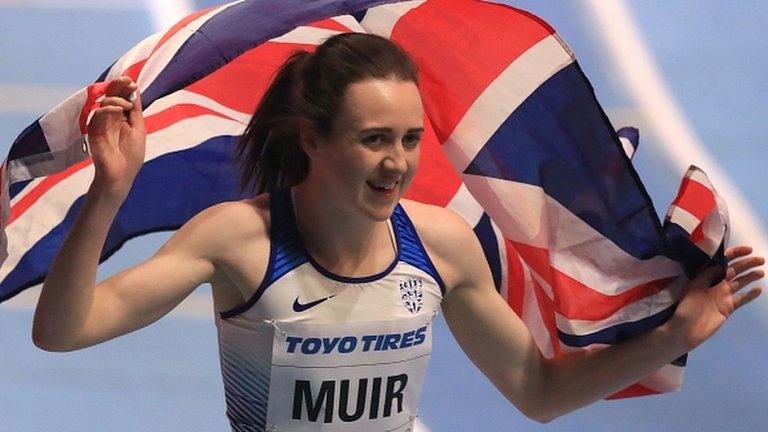Anyika Onuora: From malaria to Olympic medallist in 10 months
- Published
- comments
If I'd left malaria a day longer 'it could have been fatal' - Onuora
When British sprinter Anyika Onuora took some time off to visit family in Nigeria in October 2015, she expected it to be like every other holiday.
But the 32-year-old contracted malaria and unable to walk, her Rio Olympic dream was left hanging in the balance.
Just 10 months later the Liverpudlian stood on the Olympic podium, with a bronze medal in the 4x400m relay hanging round her neck.
Not even her team-mates knew about the life-threatening ordeal she had endured just to be there. Now 13 months on from the Games, she tells her story...
A holiday to Nigeria
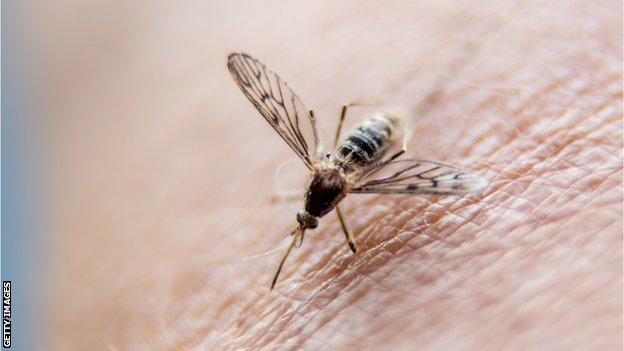
Malaria kills one child every two minutes and is responsible for 438,000 deaths every year
There was a pause and the consultant just gave me the look - the look of uncertainty. He didn't know whether I'd make a full recovery.
"You're lucky to be alive," he said.
But all I could think was 'can I leave? I've got an Olympics to train for'. I felt like my dream was being taken away from me and it was heart breaking.
It all started when I was in Nigeria - I contracted malaria but I didn't know I had it. I went to the Dominican Republic for another holiday and that was when my symptoms started to get really rough.
I emailed the doctor at British Athletics and I told him my urine was dark, really really dark.
"Are you sure it's not alcohol or you haven't been drinking and staying hydrated?" he asked. But I was hydrated and it was getting quite worrying.
Even with the symptoms, I got home from the Dominican Republic and I went back to training at Loughborough. I was in denial for a long time. But I knew I wasn't running properly and I felt weird. That's when I realised it was something much more serious. As soon as I stopped that session, the fever kicked in.
I went to get a urine and a blood test and within 12 hours the chief medical officer got back to me. "There's something wrong with your kidneys, you need to see a specialist," he said.
I had no way to get to London other than to drive myself, with a raging fever, to St John's Hospital.
Learning to walk again
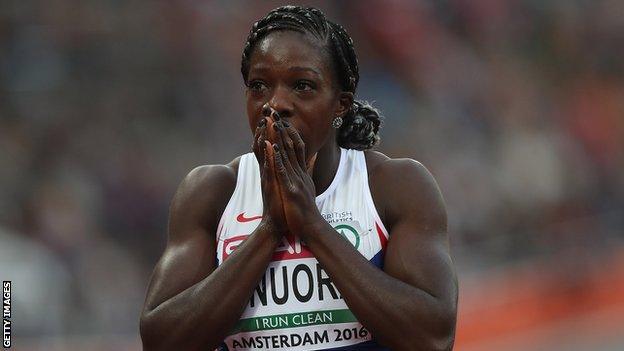
"I don't even know if I'm going to see fresh air again, feel it, or sense it"
I sometimes complain about doing a tough workout but the symptoms I had were beyond anything I could have imagined.
I had a fever, I had vomiting, stomach cramps and headaches. I was going from hot to cold, shivering, and waking up in a pool of sweat without knowing why it had happened or where it had come from.
By the time they diagnosed me and told me I had malaria my fever was reaching 40C and they said "we need to throw you in an ice tub", but I couldn't move, I could barely breathe. The nurse had to put bags of ice around the bed because I couldn't get to the tub - I was in so much pain.
I was then put in quarantine and I wasn't allowed to leave. I couldn't even go outside and I remember gazing out the window and thinking how amazing London looked. I didn't know if I was ever going to see fresh air again.
I also had to learn to walk again. When I was moved to the ward I tried to do laps and I was fighting with the nurses because they said I should be in bed resting. But I needed to walk, I needed some sort of movement, I needed to be active - this was my winter training, I should have been out on the track.
The day I got released from hospital, it was my birthday and as soon as I walked outside I took a deep breath of air. I was so thankful to have the opportunity to do that, because not many people are able to survive it.
I think if I was a regular person I wouldn't have known it was malaria. I would have just taken some tablets and thought it was a cold.
They told me if I'd have left it a day or two days later it could have been fatal. I'm thankful that I caught it as early as I did.
Getting back on track
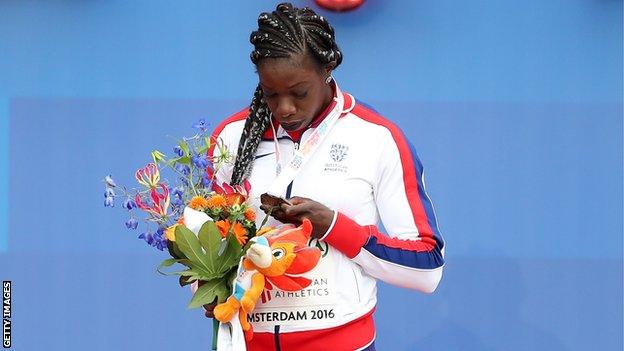
At the 2016 European Championships in Amsterdam, Onuroa won bronze in the individual 400m and gold in the 4x400m relay
I went through the absolute worst in that hospital and I nearly had everything taken away.
But as soon as I could walk again, I started running. No matter how much the training sessions killed me, I was just so grateful to be there.
Originally the European Championships weren't in my plans before the 2016 Rio Olympics, but because of the circumstances that led to my performances at the national championships - the Olympic trials - I had to go to the Europeans in Amsterdam to get a medal.
So nine months after contracting malaria I won my first global individual medal - a bronze in the 400m before gold in the 4x400m relay.
That didn't get me an individual place at Rio 2016 but I was selected for the relay and I said "I'm not coming back to the UK without an Olympic medal".
And in August, I got everything I'd ever dreamed of.
Alongside my team-mates Christine Ohuruogu, Emily Diamond and Eilidh Doyle we won bronze in the 4x400m relay.
I remember shaking on the podium. I'd been at the Europeans and got a medal, been to the Commonwealths and the World Championships in Beijing, but an Olympic medal? It was amazing. You just want to stare at it and hold it, it's like a new born child that you've just created and you don't want to let go.
Keeping a secret
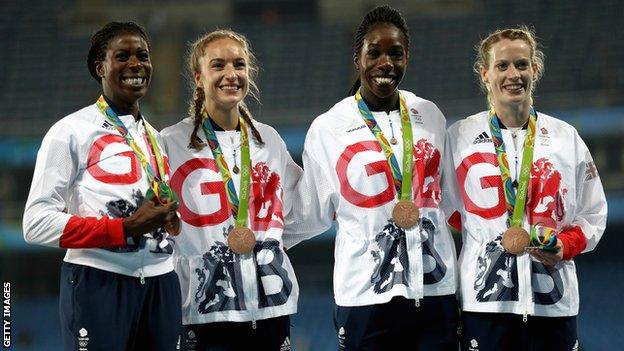
Christine Ohuruogu, Emily Diamond, Anyika Onuora and Eilidh Doyle won bronze in the 4x400m at Rio 2016
Only a handful of people knew what had happened to me in the months building up to the Olympics. I told 400m runner Martin Rooney because we were training partners and I also told long jumper Shara Proctor.
I didn't know how people would react so I decided to keep the fact I'd had malaria a secret, even from my 4x400m relay team-mates.
I am always accountable for everything I do and if I had a bad race in 2016 I didn't want anyone to use the malaria as an excuse. I just wanted to focus on the season and not think about it.
Even when I got the Olympic medal, I wasn't too sure about telling people - I felt exposed at the time but the response when I finally did was amazing and completely overwhelming.
Sometimes I still get nightmares about what happened in the hospital. I didn't want to have to remember it but speaking about it gives me a sense of relief and closure.
The future
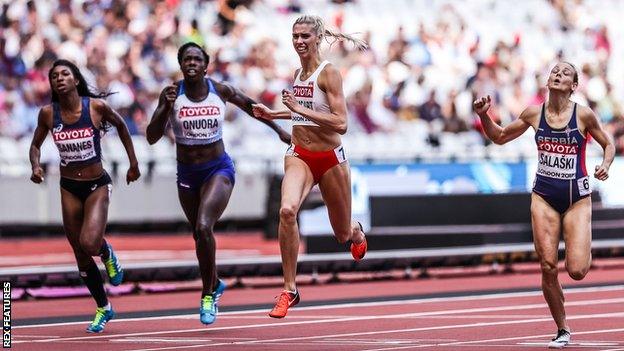
Onuora ran in the 400m heats at London 2017 World Championships in August
I am now an ambassador for Malaria No More, external UK - an amazing charity who are bringing the disease to the forefront. They're teaching people that this is a global disease and not just in Africa.
People are sometimes worried about going to Africa because of Malaria but Nigeria is like home for me and I love going back - it's where my parents were born and bred. After my dad passed away in 2012 I said I'd go back as often as possible and I might even retire there one day.
I know many people who have passed away from Malaria. I have a cousin who died from the disease so it makes me truly grateful that I survived and am able to tell my story.
In terms of my performances on the track, I'm not in exactly the same shape as before. Over the last two years my times have been up and down, but I don't think that's related to malaria. I'm just feeling my way with the 400m.
I'm definitely capable of running as quick as I have done in the past and malaria by no means is going to stop me. The biggest thing I took away from this experience is strength, strength I never knew I had.
We've got the Commonwealth Games in the Gold Coast and the European Championships in Germany next year so hopefully there are more medals to come.
Anyika Onuora was talking to BBC Sport's Jess Creighton.
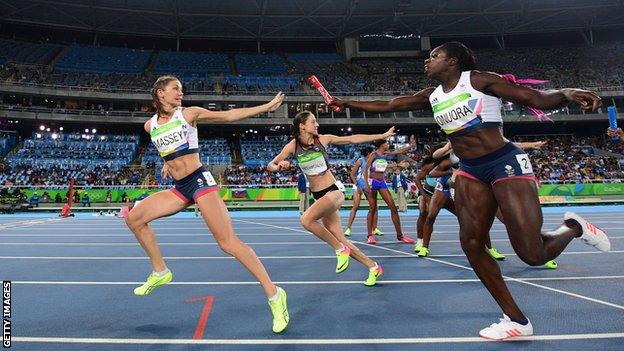
Onuora ran the second leg for Great Britain in the 4x400m relay final at Rio 2016
- Published21 August 2016
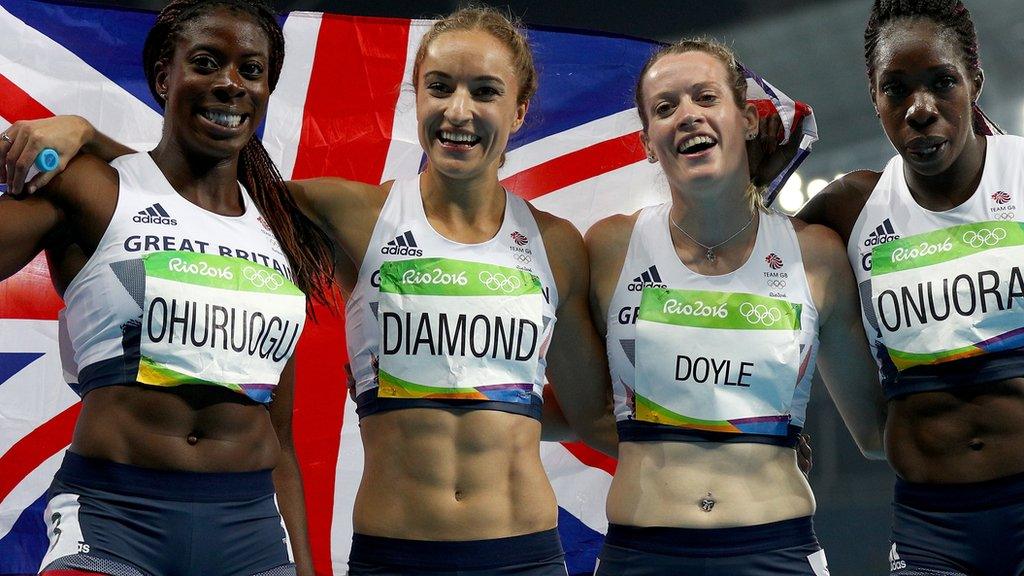
- Published3 March 2018
